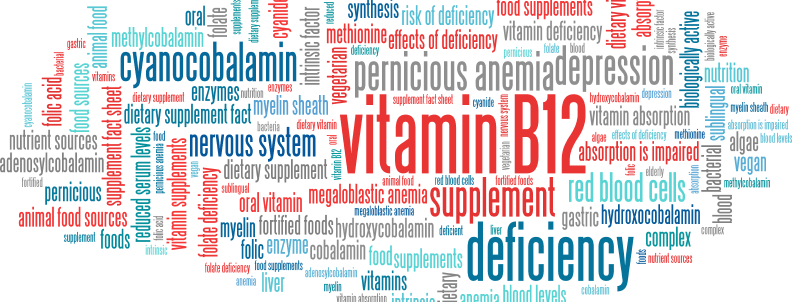Getting your daily recommended dose of vitamins isn’t always easy, but this can be especially true when it comes to vitamin b12. Vitamin b12 (also called cobalamin or in it’s different forms cyanocobalamin, methylcobalamin and hydroxocobalamin) plays a key role in the overall function of the brain, nervous system, and even the formation of blood within the body. Even so, many people aren’t getting the daily dosage of this vitamin that the body needs.
Importance of Vitamin b12
Because vitamin b12 plays such a huge role in the nervous system, brain function, and blood production, there are many ways in which a b12 deficiency can impact the body. Specifically, those who aren’t getting enough vitamin b12 often find that they suffer from ongoing symptoms such as:
- tingling in the hands, legs, and feet
- general, unexplained fatigue
- memory loss and other cognitive difficulty
- paranoia and hallucinations
Unfortunately, because many of these symptoms can be attributed to other medical conditions it can be very difficult to diagnose a vitamin b12 deficiency without specifically testing for b12 levels within the body.
Decreased b12 Absorption With Age
Anybody can be vitamin b12 deficient, but it’s more common among the elderly. That’s because, as people age, the body’s natural ability to absorb this vitamin from food decreases significantly. Furthermore, older people tend to eat fewer foods that are rich in vitamin b12 as they age, which only contributes to the problem.
Specifically, a 2014 study on vitamin b12 deficiency found that instances of vitamin b12 deficiency increases with age, with more than 14% of those over the age of 90 not getting enough of the vitamin (compared to less than 10% in patients under the age of 60).
Unfortunately, vitamin b12 deficiency is often mistaken for other conditions in the elderly (such as Alzheimer’s and dementia) because the symptoms can be similar.
What You Can Do
Although the consequences of a vitamin b12 deficiency can wreak havoc on the body, the good news is that there are plenty of proactive steps people can take as they age to ensure they’re getting enough b12.
For starters, it’s a good idea for those 50 years of age and older to have their b12 levels checked by a doctor. This is especially recommended among those who are diabetic and/or vegetarian. Generally, any reading below 250 picograms of b12 per milliliter of blood serum is considered to be low.
Daily supplements can be taken for those who have a slight deficiency of the vitamin itself. These can be found at any health and wellness store and even in some grocery and convenience stores.
For those with more severe deficiencies resulting from poor absorption, taking an injectable vitamin b12 can help ensure maximum absorption into the body and may be recommended by a doctor.
As you can see, vitamin b12 is an important component when it comes to keep your nervous system, circulation, and even brain function maximized. As such, it’s vital to be aware of the signs of a deficiency as well as knowing how to get enough of this vitamin into your diet.

 B12 Deficiency Increases With Age: Paris Study
B12 Deficiency Increases With Age: Paris Study
13 Comments
Thank you so much for making such a good compilation of articles on vitamin B12. I’ve been concerned lately about this vitamin because test showed deficiency of it in my body. And I was looking for a website like this which would give me easy access to all the important information I need to know regarding this valuable nutrient. It’s indeed a matter of regret that even though B12 deficiency has become so prevalent in recent times, very few of us are aware of its necessity. So it’s really important to educate people about how their health could be affected as a result of this vitamin’s deficiency.
Andrew McColley liked this on Facebook.
Suzanne Lynn liked this on Facebook.